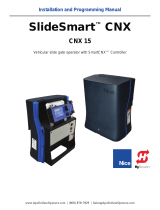Page is loading ...

BLUEBUS PHOTO EYE QUICKSTART GUIDE - 1050 CONTROL BOARD
•
•
DISCONNECT POWER at the control panel before making
any electric service power connection.
Be aware of all moving parts and avoid close proximity to
any pinch points.
• Know how to operate the manual release.
• Adjust the unit to use the minimum force required to
operate the gate smoothly even during mid-travel
reversing.
• Place controls a minimum of 8 feet away from the gate so
that the user can see the gate and operate controls but
cannot touch the gate or gate operator while operating the
controls.
• Warning signs must be placed on each side of the gate or
in high-visibility areas to alert of automatic gate operations.
Photocell
CLOSE DIRECTION A
CLOSE DIRECTION B
CLOSE DIRECTION 2A
CLOSE DIRECTION 2B
OPEN DIRECTION A
OPEN DIRECTION B
NOT USED
Installation Instructions:
Close Direction A/B: Resets timer to close in open
position, reverses gate if closing, no effect if gate is closed
or during opening cycling. Typically used when the photo
eyes are on the outside of the property (gates opening
inward).
Close Direction 2 A/B: Resets timer to close in open
position, reverses gate if closing AFTER obstruction is
cleared, pauses the gate on opening cycle - opening
resumes after obstruction clears. Typically used when the
photo eyes are on the inside of the property (gates opening
inward).
Open Direction A/B: Delays gate opening from closed
position. Stops and reverses gate back closed on open
cycle. Typically used to protect an entrapment point when
the gates are opening.
BlueBus Photo Eyes:
BlueBus photocells are thru-beam devices -
consisting of a transmitter (TX) and a receiver (RX)
that connects via two (2) wires. Polarity of the
wiring is not important. They may be wired in
parallel to one another or directly to the board - it is
not necessary to make a “home run” to the board
with each unit. Multiple sets may be used, however
each PAIR must be set to an exclusive address by
setting the jumpers in the units. What this means,
is that each pair of eyes must have their jumpers
set to match each other - but every pair must be
set differently from the other pairs. The address
jumpers also determine the functionality of each
set of eyes: Open direction or close direction, etc.
(see Table)
Jumpers
PRIOR TO INSTALLTION:
www.ApolloGateOpeners.com | (800) 878-7829 | [email protected]
1. Mount the transmitter and receiver appropriately
to a rigid mounting surface. Eyes should be placed
appropriately to protect areas of entrapment
according to UL325 guidelines.
2. Set the jumpers in each pair of eyes to match
each other. Ensure that each pair of eyes are set
differently. Use the table to find the setting of the
jumpers that corresponds to the functionality
desired from each pair of eyes.
3. Connect the EPMOBs to the Bluebus connector
of the circuit board. Polarity of the wiring is not
important. Eyes may be connected in parallel to
one another or directly to the board.
4. LEARN the Bluebus Port:
a. Press Functions (1. Learn)
b. Press "OK" (Learn Bluebus)
c. Press "OK" (Allow board to scan the Bluebus Port)
d. Once Complete - Test functionality of each set of
photo eyes
5. Fine tune the alignment of each pair of eyes. The
more slowly the lights flash on the units, the better
they are aligned.
/

